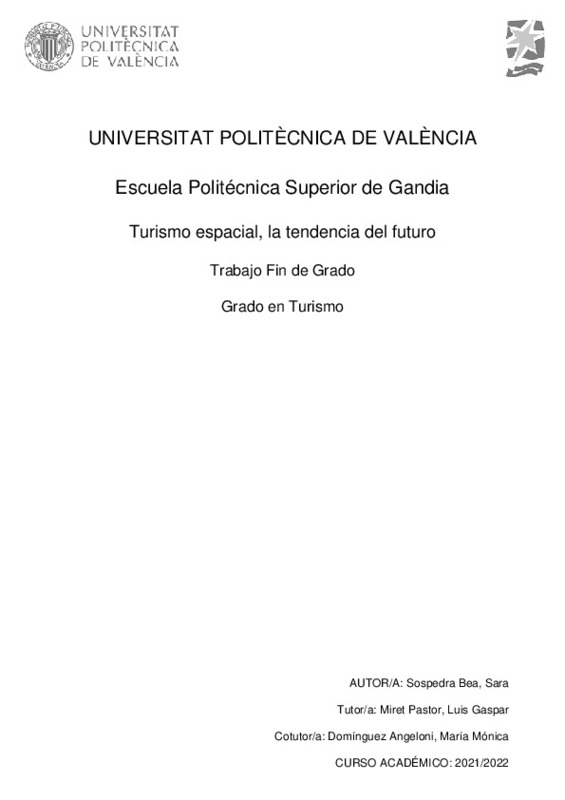JavaScript is disabled for your browser. Some features of this site may not work without it.
Buscar en RiuNet
Listar
Mi cuenta
Estadísticas
Ayuda RiuNet
Admin. UPV
Turismo espacial, la tendencia del futuro
Mostrar el registro sencillo del ítem
Ficheros en el ítem
| dc.contributor.advisor | Miret Pastor, Luis Gaspar
|
es_ES |
| dc.contributor.advisor | Domínguez Angeloni, María Mónica
|
es_ES |
| dc.contributor.author | Sospedra Bea, Sara
|
es_ES |
| dc.date.accessioned | 2022-09-07T11:22:15Z | |
| dc.date.available | 2022-09-07T11:22:15Z | |
| dc.date.created | 2022-07-21 | |
| dc.date.issued | 2022-09-07 | es_ES |
| dc.identifier.uri | http://hdl.handle.net/10251/185499 | |
| dc.description.abstract | [ES] El ser humano siempre ha tenido la ambición de explorar lo inexplorado y siempre superándose a sí mismo, encontramos un ejemplo representativo en la aviación, hoy en día posible tras siglos de fracaso. Todo se remonta al final de la Segunda Guerra Mundial, en 1945, cuando las bombas atómicas le recuerdan a la humanidad la necesidad de buscar alternativas a la Tierra en caso de que esta resultara inhabitable, lo que lleva a la investigación del tema que nos ocupa, el espacio. Para poder entender qué es el turismo espacial, se analizará su historia, cómo nace y como se está desarrollando, cuáles son sus ventajas e inconvenientes para la humanidad y para el medioambiente y se procederá a analizarlo críticamente. | es_ES |
| dc.description.abstract | [EN] Humanity has always had the ambition to explore the unexplored and always overcoming itself, we find a representative example in aviation, possible today after centuries of failure. It all goes back to the end of the World War II, in 1945, when atomic bombs remind humanity of the need to look for alternatives to the Earth in case it becomes uninhabitable, which leads to the investigation of the issue at hand. space. In order to understand what space tourism is, its history will be analyzed, how it was born and how it is developing, what are its advantages or disadvantages for humanity and for the environment, moreover a critical analysis of the topic will be carried out. | es_ES |
| dc.format.extent | 32 | es_ES |
| dc.language | Español | es_ES |
| dc.publisher | Universitat Politècnica de València | es_ES |
| dc.rights | Reserva de todos los derechos | es_ES |
| dc.subject | Turismo espacial | es_ES |
| dc.subject | Sostenibilidad | es_ES |
| dc.subject | Basura espacial | es_ES |
| dc.subject | Space tourism | es_ES |
| dc.subject | Sustainability | es_ES |
| dc.subject | Space junk | es_ES |
| dc.subject.classification | ECONOMIA APLICADA | es_ES |
| dc.subject.other | Grado en Turismo-Grau en Turisme | es_ES |
| dc.title | Turismo espacial, la tendencia del futuro | es_ES |
| dc.title.alternative | Space tourism, the trend of the future | es_ES |
| dc.title.alternative | Turisme espacial, la tendència del futur | es_ES |
| dc.type | Proyecto/Trabajo fin de carrera/grado | es_ES |
| dc.rights.accessRights | Abierto | es_ES |
| dc.contributor.affiliation | Universitat Politècnica de València. Departamento de Economía y Ciencias Sociales - Departament d'Economia i Ciències Socials | es_ES |
| dc.contributor.affiliation | Universitat Politècnica de València. Escuela Politécnica Superior de Gandia - Escola Politècnica Superior de Gandia | es_ES |
| dc.description.bibliographicCitation | Sospedra Bea, S. (2022). Turismo espacial, la tendencia del futuro. Universitat Politècnica de València. http://hdl.handle.net/10251/185499 | es_ES |
| dc.description.accrualMethod | TFGM | es_ES |
| dc.relation.pasarela | TFGM\144765 | es_ES |
Este ítem aparece en la(s) siguiente(s) colección(ones)
-
EPSG - Trabajos académicos [5004]
Escuela Politécnica Superior de Gandia






